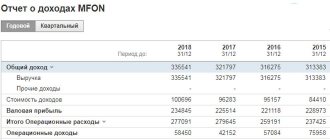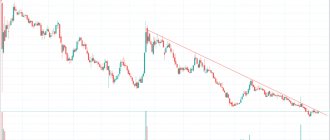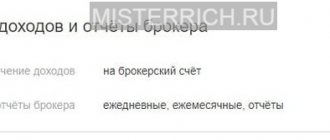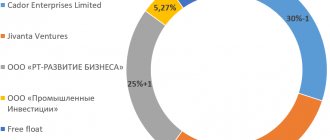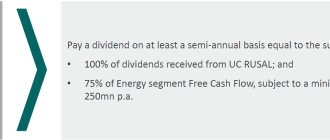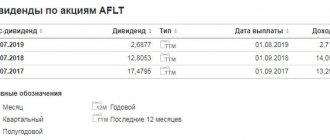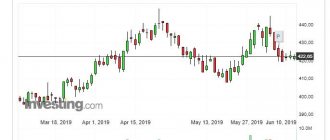Hello!
Today I will lift the curtain on Rusal’s dividend policy. I will answer the most pressing question: what dividends will RUSAL pay in 2021 and when? And will he pay at all?
I will talk about the specific principles for calculating dividends of the issuer. Why do they largely depend on dividend payments from MMC Norilsk Nickel? How to predict them and what kind of profitability can shareholders expect in the near future?
In addition, using the example of past payments, I will show when it is necessary to purchase the issuer's securities in order to receive dividends, as well as how to choose a good brokerage firm for your operations.
Securities data
| Ticker | MCX: RUAL HKSE: 486 |
| Trading platforms and trading times | Moscow Exchange: from 10:00 to 18:40 Moscow time. Hong Kong Stock Exchange: from 5:00 to 11:00 Moscow time. |
| Name | United Company RUSAL plc. |
| Number of securities in circulation | 15 193 014 862 pcs. ordinary shares |
| Denomination | $0.01 |
| Dividends | Temporarily not paid |
| Year of foundation | 2007 |
| Founded by | Roman Abramovich and Oleg Deripaska |
| Headquarters | Russia, 121096, Moscow st. Vasilisa Kozhina, 1 |
When will dividends be paid in 2021?
The base case scenario assumes that RUSAL will not issue dividend payments to shareholders in [year].
The last time RUSAL distributed profits among shareholders was in 2017. The issuer's dividend calendar assumed the establishment of a register closing date for recording participants entitled to receive payments on September 7.
But since the Moscow Exchange operates in the standard “T+2” mode (trading day + 2 trading days), in order to receive dividends, it was necessary to buy shares before the close of trading on September 5, 2017.
Funds usually arrive in investor accounts between 1 and 4 weeks after the closing date of the shareholder register.
About company
The Rusal Corporation appeared as part of the merger of several production structures in 2007. The main participants in the process of merging assets were famous businessmen Roman Abramovich and Oleg Deripaska. Subsequently, the first decided to exit the asset and sold his share in Rusal to the second entrepreneur.
In its activities, the company developed on a grand scale, not disdaining credit funds, which provided many processes of mergers and acquisitions of other organizations. One of the biggest transactions can be called the purchase of a quarter of the business of the MMC Norilsk Nickel production holding.
The high debt burden, which also contained many loans in foreign currency, turned out to be a heavy burden for the Rusal corporation during the 2008 crisis. But the company was able to maneuver the situation and get out of this story without any major losses.
In April 2021, Rusal again found itself in a difficult situation. Sanctions were imposed on its main owner - Oleg Deripaska - and the organizations belonging to him (including En+, Eurosibenergo, GAZ).
Investors understood that these restrictive measures could hit the business of the Rusal Corporation very hard; at the opening of the trading session in Hong Kong, the issuer's shares almost instantly lost half of their value.
However, the United States did not introduce a complete ban on activities under existing contracts with, limiting only the possibility of concluding new agreements. At the same time, expectations of a reduction in the supply of aluminum on the market provoked a sharp increase in the price of the metal. This was able to absorb the momentary negative effect on the company's shares, and the quotes recovered slightly.
In February 2021, in accordance with the so-called Barker plan, representatives of En+ and Rusal managed to convince the United States to lift sanctions on the issuer.
Production of the company
The basis of Rusal's production activities is aluminum, its alloys and end products from this metal.
Main shareholders
The main shareholders of Rusal Corporation are:
- "En+" - 50.10%
- "SUAL Partners" by Viktor Vekselberg - 26.50%
- AmokengaHoldings (Glencore) - 6.78%.
The rest are in free circulation.
Key figure and her role
The main manager of the Rusal organization is Evgeny Nikitin. His responsibilities include managing the current operating activities of the corporation and monitoring the process of implementing decisions of the board of directors and the general meeting of shareholders.
Affiliated companies
The organizational model of a corporation involves a large number of subsidiaries, which are included in divisions regarding the type of their activities.
The main divisions are:
- Aluminum smelting. About 15 enterprises.
- Bauxite mining. 6 sites.
- Alumina production. 11 factories around the world.
- Foil production.
- Silicon production and powder metallurgy.
- Engineering and construction division.
- Energy Division.
- It-service.
- RUSAL Corporate University.
Company plans for the future
According to our own forecast, the advanced goals of further activities in the company will be:
- Maintaining the organization's leading position as one of the most profitable aluminum producers with the smallest carbon footprint.
- Active R&D activities to develop unique types of aluminum alloys and final products, as well as innovations leading to increased production profitability.
- Increasing flexibility in matters of maneuvering the market situation.
- Increasing the share of value-added products and increasing overall margins.
- Increasing the sales share in the main market for RUSAL - Russia and the CIS,
- Creation of new areas of use of aluminum products, stimulating the growth of metal consumption in Russia.
- Organization of a joint venture with partners, including new processing capacities on the basis of existing enterprises in which the primary aluminum production line had previously been stopped.
- Work to improve the environmental friendliness of technical processes.
- Vertical integration of the full production cycle to protect against external risks.
- Transport security of business by optimizing the logistics system.
- Optimizing the capital structure and increasing share liquidity.
Dividend statistics
Rusal's dividend policy sets the minimum payout on ordinary shares at 15% of the covenant Ebitda (this includes Rusal's Ebitda and dividends received from MMC Norilsk Nickel).
During the sanctions period, the company did not pay dividends on shares, but the CEO of Rusal says that the company plans to return to payments in the near future.
Payout statistics per share:
| Payment period | Dividend per share in rubles |
| 2017 | 1,14 |
| 2016 | 1,04 |
| 2015 | 0,94 |
Interesting facts about the company
Rusal is one of the world's largest aluminum producers and has the lowest production costs among its competitors.
How to buy shares and receive dividends
RUSAL shares are listed on the Moscow Exchange. The most logical and simplest option for a private investor would be to purchase securities through a Russian brokerage company.
Best brokers
Reliable Russian brokers
| Name | Rating | pros | Minuses |
| Finam | 8/10 | The most reliable | Commissions |
| Opening | 7/10 | Low commissions | Imposing services |
| BKS | 7/10 | The most technologically advanced | Imposing services |
| Kit-Finance | 6.5/10 | Low commissions | Outdated software and user interface |
Here you can get acquainted with the best representatives of brokerage activities in Russia. These firms have a high level of reliability, competitive commissions and provide excellent investment services.
Warning about Forex and BO
Expert opinion
Vladimir Silchenko
Private investor, stock market expert and author of the Capitalist blog
Ask a Question
Binary options are pseudo-financial online platforms that offer their clients to place bets on price movements of an asset over a certain period of time.
Over a long period of play, clients are doomed to failure, as they are dealing with the standard technique of negative mathematical expectation in bets. No real transactions for purchasing property rights through securities are carried out here!
Forex is an over-the-counter foreign exchange market. It is also not possible to buy shares of issuers through a Forex dealer.
What affects the stock price
The market value of a company's shares is affected by:
- financial and operating results of the issuer
- fluctuations in the ruble exchange rate
- prices for aluminum and raw materials
- general economic trends
- changes in tax regime
- customs fees and duties.
Company prospects
Rusal's prospects look good, although the consequences of sanctions will continue to put some pressure on the issuer's business. All contracts with clients are planned to be restored by the end of 2019.
Aluminum production in the coming years will remain at a stable level, amounting to about 3.8 million tons. The launch of large projects in the future will increase this figure.
The share of products with high added value will continue to grow, and production profitability will remain at one of the highest positions among world peers.
Analytics and forecast for the security
Recommendations from analytical agencies are full of bullish forecasts for the issuer's securities, arguing for this by the fact that the valuation of shares of the Rusal Corporation is at local minimums.
If, when analyzing shares, we take into account the value of the company’s share in MMC Norilsk Nickel, then Rusal’s multiples are among the lowest values in the history of the organization. However, undervaluation in itself is not a driver for revaluation of stock prices.
After the sanctions were lifted, the shares decreased in price, which seems strange. But we must understand that the price of aluminum is extremely important for the company, and its cost has seriously decreased compared to the restrictive period.
Incentives for stock growth in the coming years may include a return to the dividend policy and inclusion in the largest indices.
Alternative in this industry
An alternative on the stock exchange may be shares of large metallurgical companies, such as MMK, NLMK, Severstal or MMC Norilsk Nickel.
What dividends will be paid in 2021?
The base scenario assumes that RUSAL will not issue dividend payments to shareholders in 2021.
But I think it’s important to note one point. A member of the board of directors of En+ (the parent company of RUSAL, the controlling shareholder) Andrei Sharonov mentioned in an interview that the aluminum producer may still assign payments based on the results of the 3rd quarter. 2019
The quarterly dividend in this case could be about 0.5-0.6 rubles (taking into account proceeds from the mining and metallurgical complex) per ordinary share.
There is still little data to calculate RUSAL's possible dividends for the entire 2021, but approximately this figure could be about 1.5-1.8 rubles per share.
Let's look into the reasons for the fall in RUSAL shares. What's next
After RUSAL published financial results for the 12 months of 2021, the company's shares began to fall. Quotes decreased in 11 of the last 14 trading sessions and currently the drawdown to local highs has reached 12.5%.
Are RUSAL's annual results really that bad?
No. The company's revenue for 2021 increased by 3.1% to $10.2 billion. Adjusted EBITDA increased by 2% to $2.2 billion. Net profit for the period increased by 39% to $1.7 billion (excluding share in Norilsk Nickel, profit increased by 7.8% y/y). If you look at the company's results for the fourth quarter of 2021, there is a decrease relative to previous quarters. However, it should be remembered that RUSAL was under US sanctions throughout the year and nevertheless was able to demonstrate an increase in results compared to the previous year.
On January 28, the US Treasury lifted sanctions against the company. Therefore, the results for the past year become irrelevant for analysis. In 2021, RUSAL reduced the volume of sales of primary aluminum and alloys by 7.2%, and alumina by 4.4% compared to 2021. In early March, the company’s CEO Evgeny Nikitin said that the company intends to restore long-term contracts with customers for 2021 in the next 3-4 months. He also stated that RUSAL intends to maintain production at the level of 2021. It is worth considering that due to external restrictions, the company was not able to sell all of its products at the end of 2021. As a result, its finished product inventories were increased by 38% as of 31 December (from $898 to $1,245 million). Thus, if RUSAL manages to promptly restore contracts with counterparties, we can expect sales to return to 2021 levels.
Most likely, we will be able to see objective results of operating activities only in the second quarter of 2021.
Then what could be the reasons for the fall?
At the moment, RUSAL is trading at prices that were before the news about the possible lifting of sanctions. One of the reasons for this phenomenon is the arbitrage between the prices of RUSAL shares on the Moscow and Hong Kong exchanges, which developed during the sanctions period. This is because foreign investors have higher risk aversion.
Russian investors were more accepting of sanctions pressure on the company. Thus, during the sanctions period, the price on the Russian stock exchange was inflated relative to the main stock placement site in Hong Kong. After the lifting of sanctions, arbitrage transactions again became available to large participants, who returned the spread between exchanges to the usual ratio of 0.95-1.05. However, this does not explain the reason for the decline in the last month, since the ratio has already recovered to normal levels.
Direct factors
We do not see any objective reasons. RUSAL's financial results depend on two main factors: 1. World prices for aluminum expressed in rubles 2. Cash flow from Norilsk Nickel (RUSAL owns a 27.8% stake in MMC).
During the period from March 7 to March 27, RUSAL's quotes fell by 12.5%, while MMC shares fell only by 3.9%, and ruble prices for aluminum even increased by 0.6%. Thus, the negative influence of direct factors also disappears.
News flow
The news flow on RUSAL over the past month did not contribute to the fall. On March 12, there was information that the company plans to complete the construction of the first series of the Boguchansky plant at the end of March - neutral, since it has almost zero contribution to the company’s results.
On March 15, Russian businessman Oleg Deripaska sued the United States, saying that Washington overstepped the legal bounds when it imposed sanctions against Deripaska's companies—neutral, since the lawsuit was filed on his own behalf, and not on behalf of RUSAL.
On March 25, Fitch assigned RUSAL a “BB-” rating with a “stable” outlook, which may lead to increased interest from foreign investors.
On March 27, MMC Norilsk Nickel intends to begin negotiations with RUSAL regarding a reduction in dividend payments, said company president Vladimir Potanin - negatively. Interest payments on RUSAL's debt amount to about 50-60% of MMC's dividends received, and if the dividend policy is revised, the pressure on the aluminum company's debt burden will increase.
Thus, with the exception of March 27, the news flow throughout the month was mostly neutral and should not have caused a revaluation of shares by 10% down.
Factors for the growth of RUSAL shares
In accordance with our regression analysis, the theoretical value of RUSAL shares today implies a potential growth of quotations by 40% to 40.1 rubles. due to an increase in the value of Norilsk Nickel’s share by 29.1% and an increase in the value of ruble prices for aluminum by 6.9% since the moment it came under sanctions.
Currently, RUSAL's net debt is $7,742 million with annual EBITDA equal to $2,163 (Net Debt / EBITDA LTM = 3.44x). However, do not forget about the 27.8% stake in Norilsk Nickel. Its market value currently amounts to $9,412 million. At closing prices on March 27, RUSAL's EV (market capitalization + net debt) is $14.3 billion, which is more than half formed by the value of net debt. In this case, the EV/EBITDA multiplier does not make sense, since it does not take into account either the numerator or the denominator a significant share in Norilsk Nickel. Therefore, for a fair assessment, we will adjust the cost (EV) to the market price of the package. Since the share in Norilsk Nickel is less than 50%, RUSAL does not consolidate its financial results in its reporting. Thus, EBITDA reflects the operating results of RUSAL exclusively.
The graph shows a strong decline in both RUSAL’s net worth and its relationship to EBITDA after the introduction of sanctions. Currently, EV/EBITDA is 2.24x, which is extremely low in the sector. The average EV/EBITDA multiple for the metals and mining industry is about 4.8x. The historical average for RUSAL is also about 4.5-5x. Thus, to return to a fair level, the shares of the aluminum company must be revalued by 80% upward.
In accordance with its dividend policy, RUSAL must pay dividends on a quarterly basis in an amount not exceeding 15% of EBITDA for the year. The company did not pay dividends during 2021, but the lifting of sanctions could bring a pleasant surprise. Assuming that RUSAL pays 15% of EBITDA, the dividend will be $0.021 per share, which corresponds to a 4.8% dividend yield at closing prices on March 27. However, the dividend policy is not enshrined in the company's charter. The new management structure was announced only recently and no public statements have been made regarding this matter. Therefore, it is difficult to assess the attitude of the new management to this issue. If RUSAL decides not to pay dividends for 2021, this should not be taken as a negative, since deleveraging is a priority for the company.
In its press release for the fourth quarter, RUSAL management presented positive forecasts for the aluminum market for 2021. They expect that global aluminum demand in 2021 will increase by 3.7% YoY to 68 million tons (in 2021 growth amounted to 3.6% y/y to 65.6 million tons). At the same time, in 2021, global supply remained virtually unchanged - 0.5% y/y (64.1 million tons).
After RUSAL was removed from the OFAC sanctions list, a potential opportunity arose for its securities to be included in international indices, in particular MSCI Russia. The provider keeps the exact criteria for including a particular company in the MSCI index secret, but some points are known. To be included in the index, the value of a company’s free-float must be above $1.5 billion (RUSAL has $1,022 million as of March 27), and to be excluded, it must be below $1 billion. Moreover, its share must be no less than 15% (RUSAL’s free-float accounts for 16% according to Moscow Exchange estimates) of the company’s total capitalization. The size of capitalization itself is also important. It should be no less than $3 billion (RUSAL’s capitalization is $6.8 billion). In addition, the annual trading turnover is taken into account.
After the lifting of sanctions, the daily median turnover of RUSAL shares on the Moscow Exchange increased 9 times ($4.5 million per day) compared to the values 3 months before. On the Hong Kong Stock Exchange, the median turnover increased 2.6 times ($7 million per day).
In addition to the stated criteria, there are also others. Therefore, we highlight the possibility of inclusion in the MSCI Russia index as a long-term driver.
We do not observe objective factors for the fall of RUSAL shares. Our view on the company's shares remains positive over the long term. The current correction has made them even more attractive. The catalyst for the growth of RUSAL shares could be the financial statements for the second quarter of 2021, which should reflect the effect of the lifting of sanctions.
Risks for the investment case of the company's shares lie in the plane of a sharp change in Norilsk Nickel's divisional policy or the restoration of sanctions pressure (low probability).
Buy Rusal shares
BCS Broker
